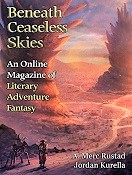 Beneath Ceaseless Skies #254, June 21, 2018
Beneath Ceaseless Skies #254, June 21, 2018
“The Sweetness of Honey and Rot” by A. Merc Rustad
Reviewed by Jeffrey Steven Abrams
“The Sweetness of Honey and Rot” by A. Merc Rustad
This moody story, which takes place in a completely alien world, revolves around Jiteh, whose twin brother has been sacrificed to the sacred Life Tree. Upon learning that her father had been taken by the tree in exchange for a promise not to harm other family members, she vows to destroy the Tree.
As the community’s beekeeper, she has a special relationship with her honey-makers. They sense her frustration, her anger, and help her whenever they can.
When she visits her childhood friend Mateu after receiving his courtship invitation, she finds fire erupting from his palms, a sign that he’s afflicted with a form of rot. Initially appalled, she sees an opportunity to exact her revenge, but fear blocks him from acting on her request. Callously, she bonds with him anyway, hoping their child will inherit his gift of fire.
In the meantime, she comes across a strange flower, growing near her hives. She learns that this flower, called Traitor’s Kiss, is poisonous to the Life Tree.
When the Life Tree takes Mateu, Jiteh is pushed over the edge, and the final assault begins.
I loved this story because it hit me on so many levels. On the surface, it was an intriguing fantasy set in a totally original, if not bizarre, world. With so many unearthly things happening, I found I looked forward to each subsequent twist. For example, be prepared for holy sloths.
Beyond the fantasy, there’s a dark story being told. Those with religious feelings might see biblical implications in the God-like tree. Those frustrated by current events might relate to the community’s sense of hopelessness in facing an untouchable foe.
While there are several superfluous bit players, Jiteh and the Tree dominate the story, and, like all real characters, are multidimensional. The Tree’s actions may be pure evil, self-preservationist, or for the good of the community. Either way, it’s that ambiguity that makes the Life Tree a wonderful villain.
In the end, there’s a sense of hope that makes, “The Sweetness of Honey and Rot” more than satisfying.
“Three Dandelion Stars” by Jordan Kurella
The story begins in the swamp of a magical world. Shai, a poor working girl, wishes upon dandelion fronds with her secret lover, Amarine, a Lord’s daughter. When a swamp fairy hears Shai’s wish to marry Amarine, the wish is granted with an odd stipulation, “The conditions are mine to consider, the consequences yours.”
As always happens in wish-granting tales, life doesn’t proceed according to plan. The two move into a run-down shack, but Amarine, unaccustomed to peasant life, falls into a deep melancholy.
Disguising herself, Shai ventures into town to buy a gift for her lover. While there, she learns that her spouse’s father, the Lord, has been slain. The townspeople long for Amarine to return as their leader, but they fear their Princess is being held by a witch. Many years earlier, Shai’s mother was similarly charged after orchestrating a tragedy in which many men died.
When Shai returns home, Amarine greets her with vigor and mirth. Shai concludes that both the Lord’s death and Amarine’s happiness are payments owed to the fairy. In a wonderful line, Shai recalls something her mother once told her, “There is no happily ever after, there is always a price.”
When a young boy shows up unexpectedly at the couple’s doorstep, Shai realizes another payment has been extracted. Amarine takes in the child as if it was her own, and soon mother and adopted-son are inseparable, leaving Shai ignored. She notices the boy’s pointy teeth and webbed digits and realizes he is a fairy but says nothing to Amarine.
Following a time of happiness, Amarine is stricken with a form of epilepsy, presumably another debt collection. Before she can recover, a final payment is made, leading to an epic battle and a somewhat unexpected ending.
Since I believe in transparency, I’ve got to admit that I’ve never been a fan of romance stories. Even though I did my best to keep an open mind, Ms. Kurella’s work did little to alter my view of the genre. At approximately 8,500 words, I thought a lot of reading was required to come away with a message that could have been reached with half the verbiage. Each major scene contained paragraphs about beauty, suffering, and undying love. While the prose was beautiful, after the second iteration, I got the message, and further repetitions just dragged down the pace for me.
On the positive side, I thought Kurella did a wonderful job handling her constructed world as scenes changed. Like time-travel stories that alter the past, each fairy-induced variation, regardless of its magnitude, had a ripple effect that only Shai noticed. To everyone else, reality was simply reality.
Being blind, I use a screen reader to enjoy online magazines. As such, I was dismayed and a little surprised by the number of editing errors I found in this story. I certainly wasn’t expecting this from a magazine of BCS’ quality.
Little errors like these rip me out of a story and can’t help but influence my overall opinion. A helpful tip to all writers; listen to your stories before submitting. You’ll be amazed at what you hear.